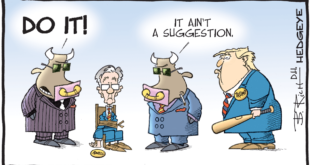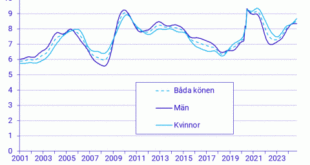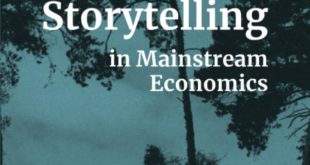from Steven Klees I am quite sure that this year’s three Nobel Laureates in economics — Daron Acemoglu, Simon Johnson and James Robinson – are very competent new institutionalist economists. Lars Syll offers a thoughtful critique of their substantive arguments, but he misses the main point for me. New institutional economics, by and large, is nonsense. We used to have many sensible institutional economists who offered a qualitative, sociological-type analysis of the role of economic...
Read More »Central bank independence — a convenient illusion
Central bank independence — a convenient illusion Today’s model of delegation has much to recommend it. But it should not be cloaked in euphemism. It is an abrogation of democratic sovereignty for pragmatic reasons, conditioned on the one hand by deeply entrenched and unflattering assumptions about electoral politics and, on the other, on an unquestioning acceptance of the private organization of credit markets and their lack of confidence in democratic...
Read More »Finanspolitiska myter II
Can it be truthfully said that “internal borrowing shifts the war burden to future generations while taxing places it on the present generation”? A thousand times no! The present generation must still give up resources to produce the munitions hurled at the enemy. In the future, some of our grandchildren will be giving up goods and services to other grandchildren. That is the nub of the matter. The only way in which we can impose a direct burden on the future nation as a whole...
Read More »Finanspolitiska myter
I debatten om det finanspolitiska ramverket hörs ibland argumentet att vi måste ha ett balansmål eftersom ett underskottsmål orättvist skulle belasta kommande generationer. Senast i veckan som gick vädrade ekonomiprofessorn Daniel Waldenström i en radiodebatt denna den politiska högerns populistiska favoritmyt. Offentliga skulder är normalt inget att frukta, särskilt om de finansieras inom landet (även utländska lån kan vara till nytta för ekonomin om de investeras på rätt...
Read More »Rethinking inflation
.[embedded content]
Read More »Varför talar ingen om detta?
Varför talar ingen om detta? Enligt färsk statistik från SCB fortsätter arbetslösheten i Sverige att öka från en redan hög nivå. Justerat för säsongsvariationer ökade arbetslösheten från 8,3 procent i augusti till 8,6 procent i september. Detta om något borde vara en tydlig indikation på hur dåligt den ekonomiska politiken fungerar idag. Trots det lyser diskussioner om arbetslöshetens oacceptabelt höga nivå med sin frånvaro i våra medier. Inte minst mot...
Read More »Wie weiter mit der Schuldenbremse?
Wie weiter mit der Schuldenbremse? .[embedded content] Einer der grundlegendsten Denkfehler in der heutigen Diskussion über Staatsschulden und Haushaltsdefizite ist, dass nicht zwischen verschiedenen Formen von Schulden unterschieden wird. Auch wenn es auf makroökonomischer Ebene notwendig ist, dass Schulden und Vermögenswerte einander ausgleichen, ist es keineswegs unerheblich, wer die Vermögenswerte und wer die Schulden besitzt. Lange Zeit...
Read More »Finanspolitiska ramverk och ofinansierade skattesänkningar
Yours truly var häromdagen i Stockholm och deltog i en forskarpanel om det finanspolitiska ramverket arrangerat av Arena Idé med anledning av den skuggöversyn Elinor Odeberg och Vilgot Österlund nyligen publicerat. Som alltid vid sådana här evenemang sägs både en del tänkvärda och en del mindre genomtänkta saker. Av det senare slaget var kanske det mest anmärkningsvärda att socialdemokraternas ekonomisk-politiske talesperson, Mikael Damberg, när han försökte försvara den...
Read More »Myterna om 90-talet som styr politiken
Myterna om 90-talet som styr politiken .[embedded content]
Read More »Riksbankens värdelösa prognoser
Nationalekonomer hävdar ofta att det inte gör så mycket om de antaganden som deras modeller bygger på är realistiska eller ej. Vad som betyder något är om de prognoser som modellerna resulterar i visar sig vara riktiga eller ej. Om det verkligen är så, är den enda slutsats vi kan dra att dessa modeller och prognoser hör hemma i papperskorgen. För oj vad fel de har haft! Riksbanken har sedan 2007 använt sig av så kallade räntebanor som prognosmedel. Genomslaget har blivit stort...
Read More » Heterodox
Heterodox




